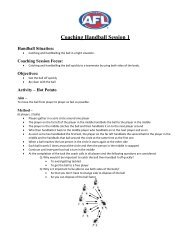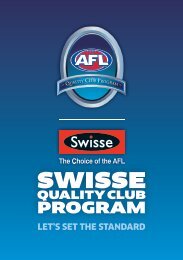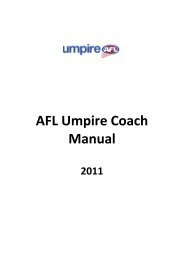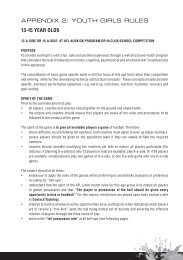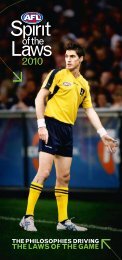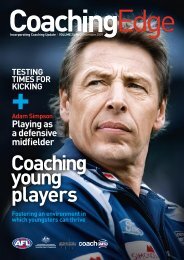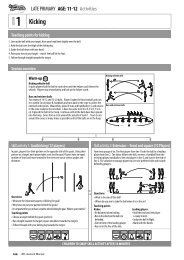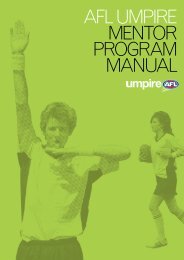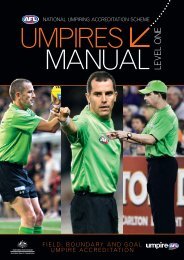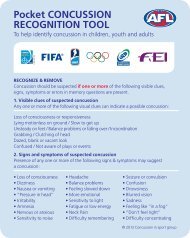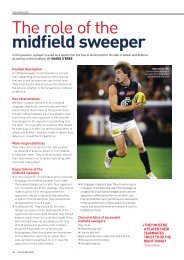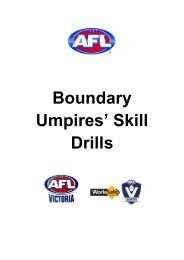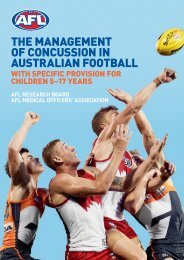2012 Youth Coaching Manual - AFL Community
2012 Youth Coaching Manual - AFL Community
2012 Youth Coaching Manual - AFL Community
You also want an ePaper? Increase the reach of your titles
YUMPU automatically turns print PDFs into web optimized ePapers that Google loves.
The following are approaches that coaches can adopt with adolescents to nurture the rapport between coach and player.<br />
1. Physiological awareness<br />
Develop an understanding of the physiological changes that typical adolescents will experience while they are under the<br />
coach’s control. Dramatic changes occur in muscle fibre types, the presence of the hormone testosterone and the growth<br />
of lean body mass. Changes to muscle fibre type are almost completed in early adolescence, which means that a player’s<br />
potential for endurance versus speed has been determined. Knowing whether a player is capable of speed and not endurance<br />
can affect a coach’s expectations in game and training situations.<br />
2. Psychosocial awareness<br />
Develop an understanding of the psychosocial changes that will confront the adolescent during the time they are under the<br />
control of the coach. Adolescents become increasingly interested in establishing an identity as well as defining their role as<br />
a future independent adult. As they move through a myriad of opportunities that confront them, they begin to make choices<br />
based on experience and a confirmed belief in their abilities. When coaching these players, it is essential to recognise the<br />
importance of supporting the choices they make about their role, particularly in the sporting context.<br />
It can be demoralising for an adolescent who has been encouraged to expect to be played in a particular role to then find<br />
themselves relocated accordingly to the policy of ‘do as your told’. The scenario can manifest itself in situations such as a<br />
player not being selected as captain or being told to shift from defence into attack. Each of these situations has the potential<br />
to erode the rapport between player and coach. All can be productive events provided the coach has prepared the athlete to<br />
accept the alternative roles that may confront them and their team.<br />
Being able to predict possible management strategies and player reaction to those strategies is one of the attributes of an<br />
effective coach. It is recommended that coaches present their coaching philosophy to the players on the day that they start<br />
their player/coach relationship. They should also be capable of providing players with the necessary rationale for making<br />
decisions about changing the player’s previously defined role.<br />
3. Awareness of self-responsibility<br />
• Show respect for the player by acknowledging their every effort and by entrusting them with positions of responsibility.<br />
This begins by making every role in the team as important as the other roles.<br />
• Adopt a non-threatening posture when the player’s body language may suggest a lack of support for the coach. It is often<br />
worthwhile when players seem to be ignoring the coach, to make an effort to informally interact with the player about<br />
any topic which is known to be of interest to the players. The icebreaker approach may be enough to curb a potentially<br />
strained relationship from negatively affecting the quality of the players’ performance and subsequently the team’s<br />
performance.<br />
• Be noticeably consistent in supporting the worth of each player’s goals and roles. This may require making a mental note<br />
of the comments made by significant others who are close to the player and can provide useful inside information about<br />
the player’s needs and wants.<br />
• At all times, the coach should avoid making the player feel as if they are being constantly analysed. Adolescents should<br />
expect that they have intimate discussions with those people who necessarily affect their lives. No matter how intriguing<br />
a particular player’s situation may be, managing their personal domain is not part of a coach’s role unless directed to do so<br />
by the player.<br />
• Understanding and respect from adolescents can only be developed through knowledge of their unique characteristics.<br />
However, it is also important to acknowledge that adolescents must understand the importance of being able to ‘do as they<br />
are told’ when part of a team.<br />
developing trust and mutual respect<br />
Coaches seem to be aware that an adolescent’s commitment to a training program and/or performance strategy will be greatly<br />
enhanced if there is mutual respect and trust not only between the players and their coach but also between the players<br />
themselves. Developing both types of respect is largely the responsibility of the coach.<br />
34 <strong>AFL</strong> <strong>Youth</strong> <strong>Coaching</strong> <strong>Manual</strong>



